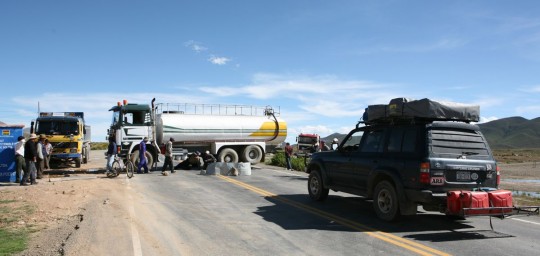
In the morning, we go get the car and we begin to drive out of the city. We eared previously it was the first day of a two-days nationwide blockade. Drivers of the whole country are upset. The government wants to pass a new law making it harder to drive under alcohol influence. They want to drive and drink, and they will block the whole country so everybody will know.
In the city, streets are emptied of cars, as most people know it’s better to not move today. Regardless, we come out of the valley where La Paz lays, and we drive south. Protesters did put sprayed a lot of rocks on the road, and we slalom between them. Soon enough, we found our first barrier, just outside of the city.
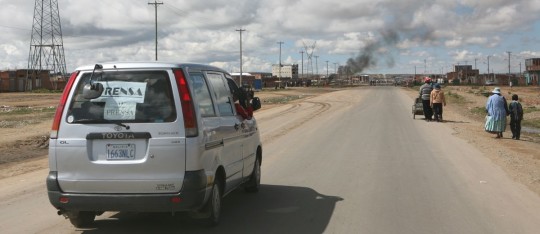
There, we meet with reporters from La Prensa, the biggest Bolivian newspaper. They are going south, and taking pictures and videos of the protests. Because they are press, protesters let them through the barrages.
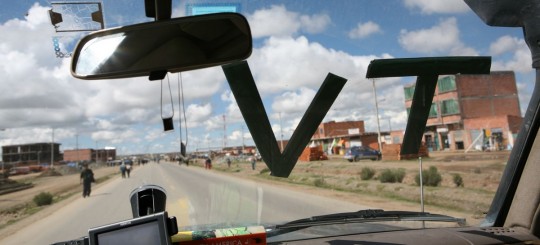
Soon enough, we are part of their convoy. With electrical tape, I mark the word TV on the windshield, and to all, we are American TV going through.
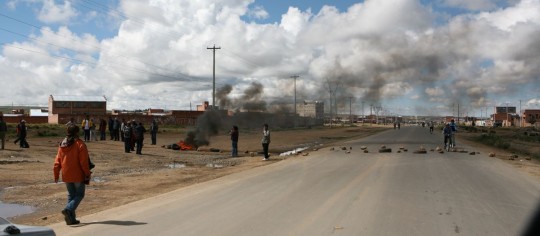
The day is long, and at every town, we have to negotiate our passage. But little by little, we advance south toward Potosi. We are back in the Pampa, and outside of towns, we can go fast in endless straight lines.
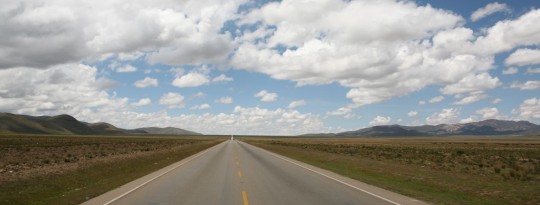
Because of cheap gas, I authorize myself to go above the speed limitation I usually follow.
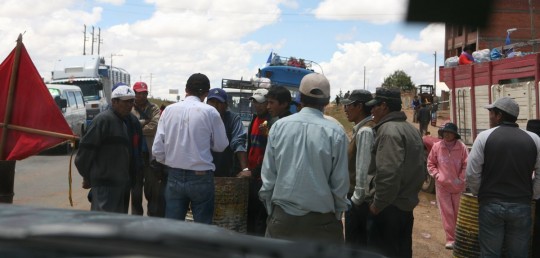
Sometimes, people would not let us go through, so we have to take dirt roads around towns, with scary river crossing once in a while.
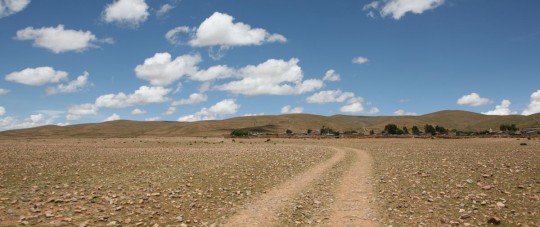
There’s a lot of salt in the surrounding landscape, which is a preview of one of our upcoming destination, the Uyuni Salar.
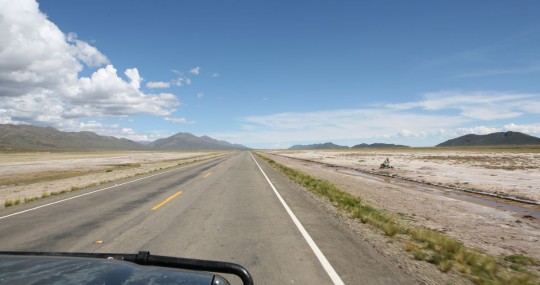
Finally, after spending an hour blocked at a last barrier, be go into the mountains where people could not care less – or don’t know about – what’s going on in the lowlands.
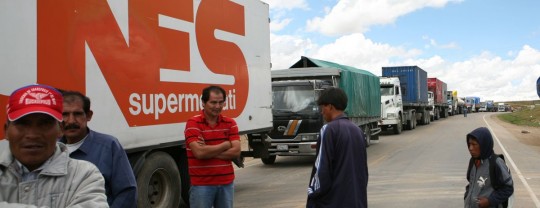
As sun goes down and night arrives, we continue on our way, wanting to make it to a stop Coen spoke to us about the previous day. Our goal is the site of hot springs north of Potosi where we knew we could camp.
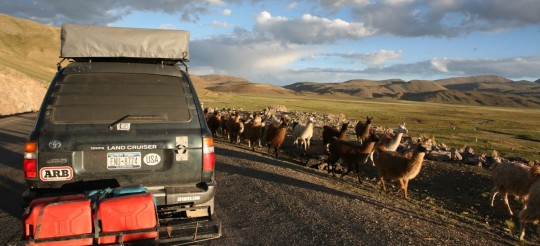
We arrived there around 8:30 p.m., and a lady let us go in for few dollars. We camp on a basketball court and go to sleep, tired after the 500 km (310 mi.) we were able to put behind us today.
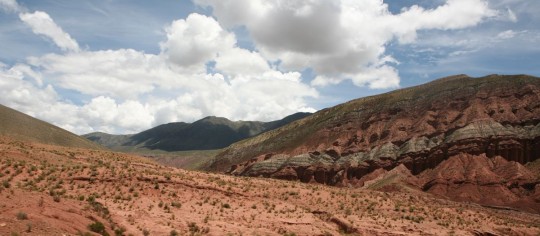
In the morning, Nadia takes advantage of the hot springs, while I work on photos and inspect the truck. We drive the 20 km (12 mi.) to Potosi and go to the market there. We have a lot of desert to cover in the next few days, so we need to buy plenty of food and water to be able to make it.
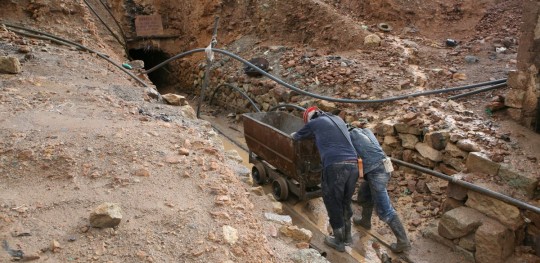
In the afternoon, we go visit the infamous Cerro Rico mines, where during the colonial period, as many as eight millions Indians and Africans died from the terrible work conditions.
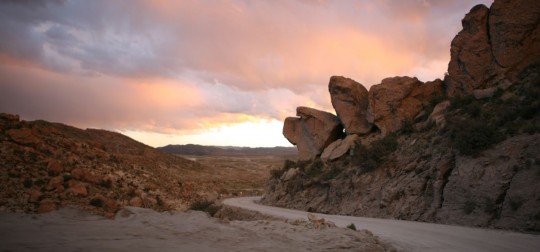
The next step is the Uyuni Salar. We leave Potosi late in the day, but have read that there is a new road to Uyuni. Well, it is true that there’s a new road, but only for the few first miles. After that, it is 250 km (155 mi.) of dirt road.
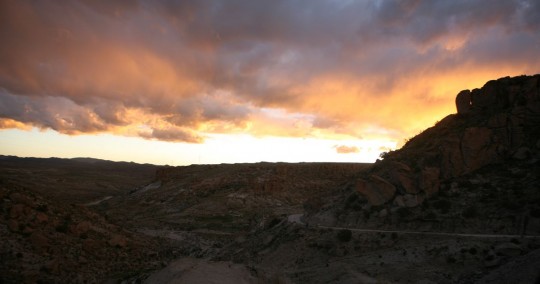
But we are not disappointed. The road is beautiful, and crosses surreal landscapes. At the end, after nightfall, we stopped on the main plaza of a town where road workers sleep at night. They are very nice, and let us stay close to one of their dormitories, protected from the wind.
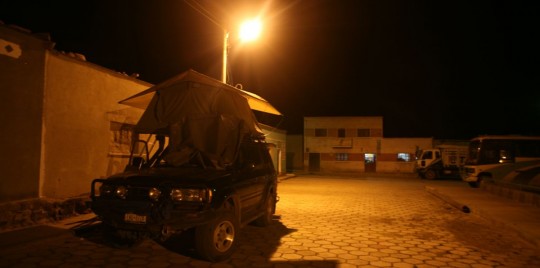
In the morning, we resume our journey toward Uyuni. After two hours, when it gets warmer, we stop to wash the dirt out of us. Soon we are back on the dirt road, for the long stretch to our destination.
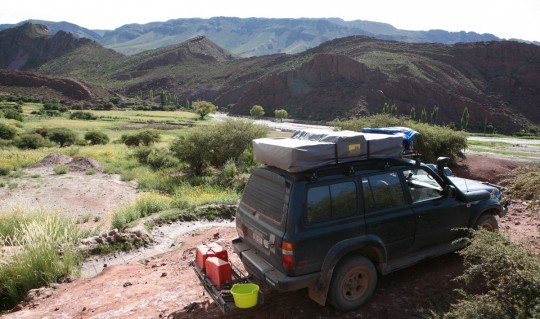
As we advance, the road gets worst. Dust and sand are everywhere in the truck. We drink plenty of water but still are as dry as the desert itself.
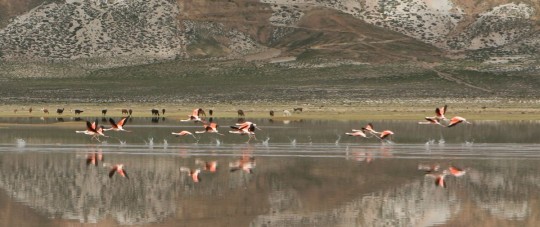
But at midday, we pass a last mountain, and get a view of Bolivia largest saltpan. The huge Salar de Uyuni was in front of us.
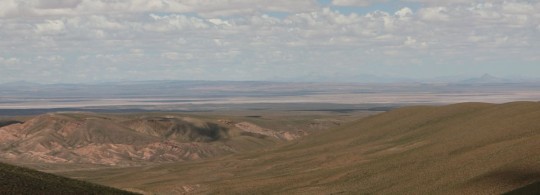
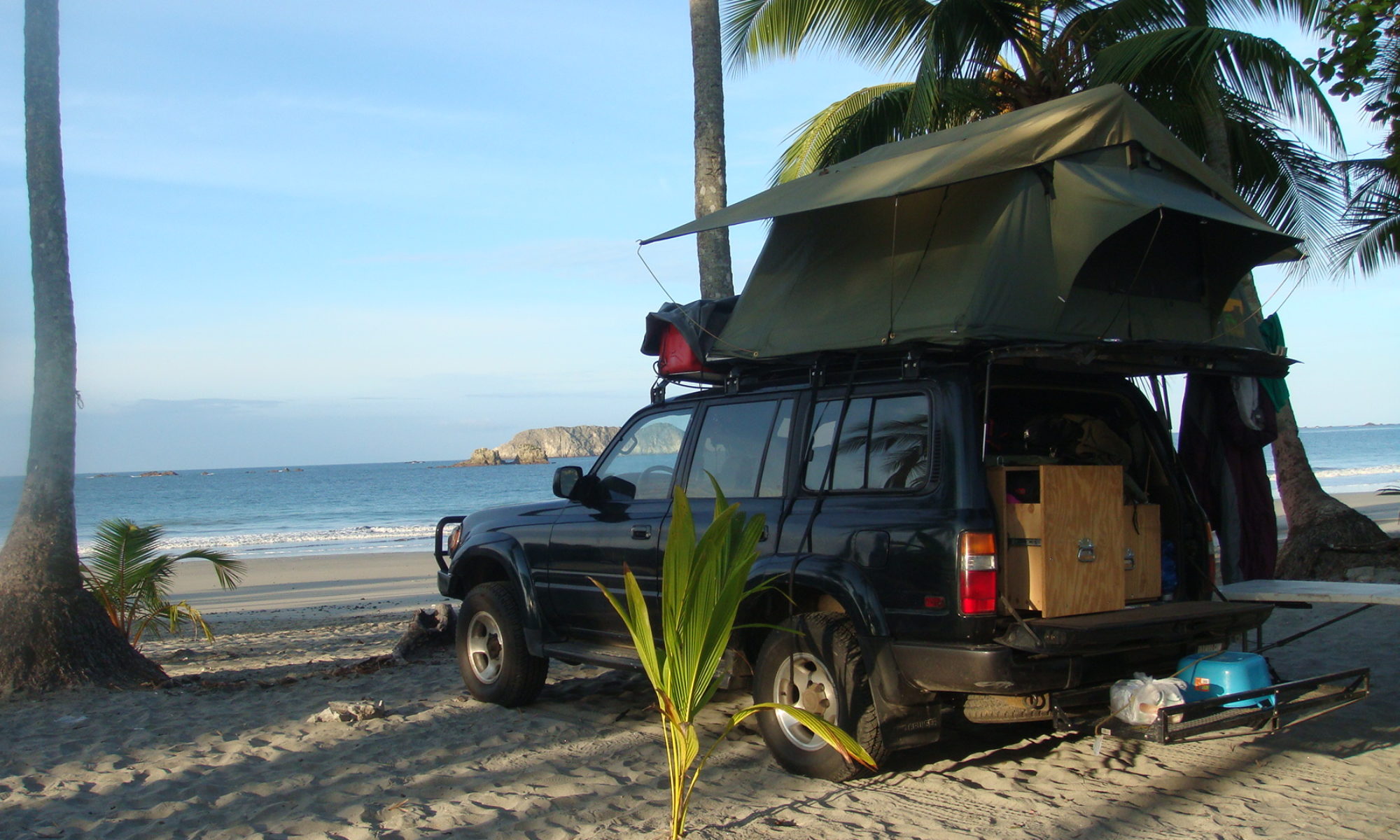
Well said
Those flamingos are amazing! Beautiful post, love the scenery.
Man, you guys are good. You’re as resouceful as Stephens and Podell were on their trip.
THE TWE STOPPED?
N E V E R !!!
KEEP ON KEEPIN ON…
The pix are spectacular and breath taking. You are wetting a lot of appetites for South American travel… Where is your commission?
Cheers
What a wild strike you had to go through all for the love of alcohol. Love the hot springs- have some here in Washington that are so worth the hike to get to them. Good to see you made it through this one as well. Wild adventure.
To make sure… Nadia was in the hot spring, you were working on photos… and you didn’t think that was a photo op the rest of us might want to see?
The pictures you have posted with this blog are wonderful. It looks like one raindrop would cause that huge boulder on the road to Uyuni to come tumbling down.
Very creative to duct tape the letters TV on your front window. LOL You two think pretty fast on your feet. You’ll be an expert at problem solving by the end of your journey. 🙂
Wow it looks like a scene out of Mad Max. I’ve been following since the beginning and I must say I’m impressed. Keep going Nick. Don’t let anything or anyone stop you!
Good job once again! I must confess, Nic, I’ve been using some of your photo’s for my desktop background, and the one of Lake Titicaca with the sun bursting through the clowds has been most enchanting, so it might stay up for a while. Would’ve loved to meet up with you in Cape Town, however we’ll be returning to the States on Apr 11. Who knows – will be checking here to see if you make it. Bon voyage, Wim.
Impressive and beautiful! Being a “foodie”…would love to hear what you prepare for yourselves on the road.
Nice pictures. And it sounds exciting. Hope to talk to you Sunday.
Just found your site and I love your idea and your story. Can’t wait to back track to see where all you’ve been! Thanks for sharing.
South Americans must spend a lot of time protesting. My son, Travis, flew to Quito, Ecuador, few years ago to climb Mt. Cotopaxi. He and his companion ended up in Banos where the people were protesting. T and buddy couldn’t get out of Banos, because all the exits were blocked with burning tires. While waiting for a ride he bungee-jumped off a bridge there twice. Once forward, then backwards. Disgruntled citizens stopped everything to watch. No ride ventured near the place, so T and friend had to walk out of Banos for 5 miles before someone gave them a lift to a bus. The photos of him on top of Cotopaxi and later in the Galapagos are spectacular, just like yours. Wish I’d had the nerve to travel like that when I was young. I can hardly wait to see your shots of Africa. Keep on truckin’.
I’ve been living in Santa Cruz, Bolivia for the last two years. The strikes [Road blockades] are a
common occurrence here. Regarding this strike, I believe the main reason behind the action is
because the government wants to restrict the use of chewing coca leaves. A large percentage of the population chews the coca leaves for its mild stimulate. These truck drivers say that without the coca leaves they could not drive the distances they do. In some parts of the world this would seem ludicrous, but here in Bolivia most believe there is no harm done by it.
Regards from venezuela, good trip and luck that you it finish successfully
Nice! We, here in California, are following your expedition around the world. Its part of what we do in our Spanish class because of where you are and everything. Its a nice breath of fresh are to see this cool, awesome adventure in the midst of American High School hahahahaha good luck and I hope you are safe and get back in one piece and with a lot of memories 🙂 Peace from L.A!
I usually don’t usually post on many another Blogs, nevertheless I just has to say thank you… keep up the amazing work. Ok unfortunately its time to get to school.
Superb, thanks for posting!
Hey its all good Bro! Like the style and reading of this blog.
The layout for your web site is a bit off in Opera. Even So I like your site. I may have to install a “normal” browser just to enjoy it. 🙂
Nick your pics look fabulous!! The Travel bug is biting my booty after looking at these shots. Good luck what a great adventure!!!! look forward to reading more!!!